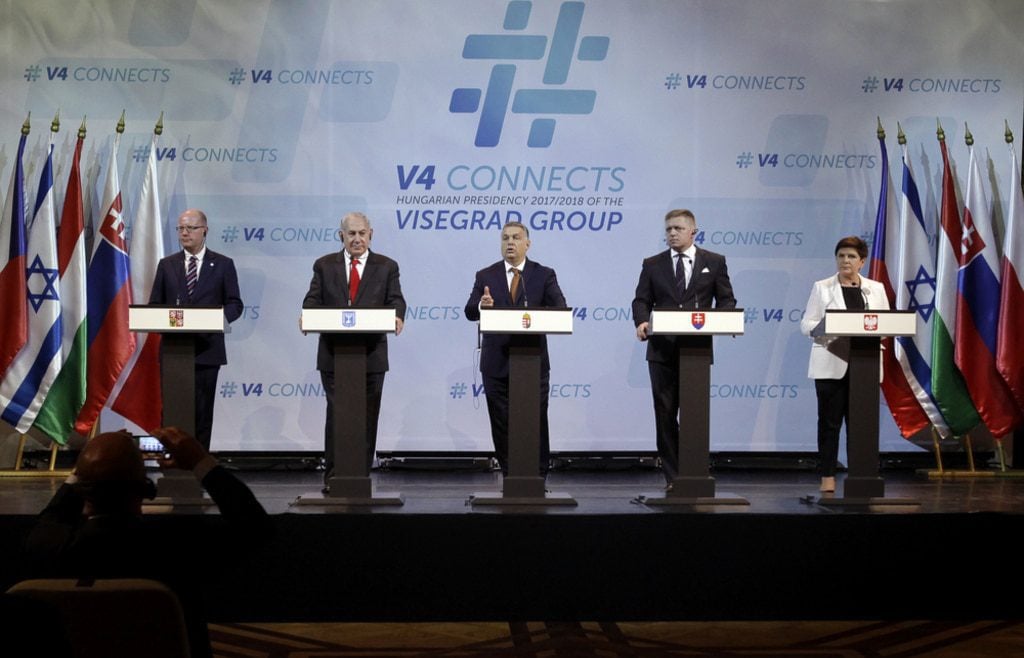
Divide and conquer. This historic slogan, attributed to Philip II of Macedon (382-336 BC), may well be top of mind for Benjamin Netanyahu. On 2 November 2018, the Israeli prime minister visited the Craiova State Forum, which brings together heads of government from Serbia, Romania, Bulgaria and Greece. Although Netanyahu regularly condemns the European Union (EU) for its hypocrisy and hostility, he is actively wooing new allies in Eastern Europe.
According to Netanyahu, the EU is hostile for criticizing Israel’s military occupation of Palestinian land and its settlements in the West Bank, both of which are illegal under international law. However, the EU is not all that united on this issue. Countries like Hungary, for example, back Israel. And Romania, tired of EU criticism about the pressure it puts on judges, is considering moving its embassy in Israel from Tel Aviv to Jerusalem – as presidents Donald Trump (US) and Jair Bolsonaro (Brazil) have done or will be doing soon. The EU is adamantly opposed to these tendencies – especially when they occur within its own ranks. Netanyahu, on the other hand, is quite happy to fan the flames: by seeking alliances with these Eastern European countries, his goal is to divide the EU. As he knows all too well, a divided EU will not be an effective critic of Israel’s policies vis-a-vis the Palestinians.
However, the EU is not naive. Of course, it possesses an intimate knowledge of the game Netanyahu is playing. Consider this tweet by the EU delegation to Israel: ‘The EU and Israel enjoy strong mutually beneficial relations. The EU is Israel’s first economic partner and a strong political ally, fully committed to its security and well-being. The EU and its Member States are one and the same, foreign policy decisions are adopted unanimously.’
It would not be the first time Israel has tried to influence European policies. In recent years, Israeli government officials, and members of government proxy groups, have visited European countries to convince parliamentarians that funding the Palestinian Authority means subsidizing terrorists, or to pressure them to adopt a definition of anti-Semitism that includes being critical of Israeli politics or supporting the Boycott, Divestment and Sanctions movement.
By strengthening relations with Eastern Europe, Netanyahu is stepping up his game to divide the EU. But according to critics, with his manoeuvres, Netanyahu is whitewashing the anti-Semitism that is rampant in Viktor Orbán’s Hungary. And in order to maintain good relationships with Poland, Netanyahu seems prepared to accept a certain kind of Holocaust revisionism.
Netanyahu’s message to Hungary and other Eastern European countries that in recent years have embraced ultra-nationalism is loud and clear. In July 2018, according to the Israeli newspaper Haaretz, Netanyahu asked his counterparts to help him face EU institutions: “I propose that you transmit a message to your counterparts in Europe. Don’t undermine the only country in the region that looks after Europe’s interests. Stop attacking Israel. Europe undermines its own security when it undermines Israel, due to a crazy attempt to impose political conditions.”
The core of the dispute is this: China or India never asks for a political favour in return for some trade agreement; and the US is very much pro-Israel. So that leaves the EU as the only world power critical of Israel’s policies. Europe likes to trade with Israel as well – but it asks for something in return. On the world stage, Israel is not used to that kind of behaviour.
Hungary, on the other hand, although an EU member state, resembles Israel in many respects. Both countries are led by nationalists who curtail NGOs and, among other things, blame the Jewish Hungarian American investor and philanthropist George Soros for all their problems. With other countries, like Poland, the Czech Republic, Slovakia and Austria, Israel shares an aversion for immigrants – especially Muslims. It has good ties with other EU countries as well: Romania, Bulgaria, Lithuania, Cyprus, Greece and Croatia.
Is the Israeli policy toward the EU succeeding? On a tactical level, one could argue it is. According to Martin Konecny, director of the NGO European Middle East Project, the Israeli connections to Eastern Europe actually prevent broader criticism by the EU. For example, a critical EU announcement about the US moving its embassy to Jerusalem was blocked because Hungary, Romania, the Czech Republic and Austria opposed it. Most of these countries are planning to relocate their own embassies to the divided city.
Other critics say that Israel is moving away from the values of a liberal democracy. As Nimrod Goren, director of the Israeli think tank Mitvim, said in the Haaretz article mentioned above: “The Economist’s democracy index ranks all these countries lower than Israel. These should not be Israel’s allies in a continent which prides itself on democratic ideals and human rights. Germany, Britain and France are much more important for ensuring Israel’s security and for fulfilling its national interests.”
In the meantime, the EU still opposes – albeit only verbally – the Israeli occupation. It drew a lot of Israeli ire with its policy of labelling products from illegal Israeli settlements in the occupied West Bank. In May 2018, Energy Minister Yuval Steinitz (Likud party) said the EU can go to “a thousand, thousand hells” after it asked for a probe into Israeli police violence against Palestinian protestors. It is fair to say that the relationship is rocky. Even so, trade between Israel and the EU stood at €36.2 billion in 2017 – an amount that neither side is likely to want to jeopardize.
According to Italian diplomat Emanuele Giaufret, the current EU ambassador to Israel, Israel and the EU “agree to disagree” on certain issues. “But they can still cooperate for everyone’s good. I’m sure we will find more ways to do so in the future.”


